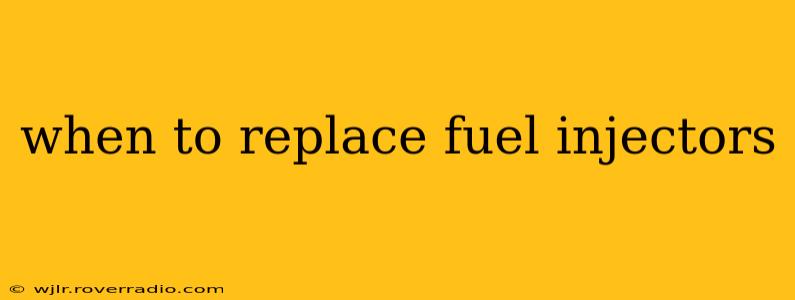Fuel injectors are crucial components of your vehicle's engine, responsible for precisely delivering fuel into the combustion chamber. Over time, these injectors can wear out, leading to decreased performance and potential engine damage. Knowing when to replace your fuel injectors is vital for maintaining your car's health and longevity. This guide will explore the key signs indicating it's time for a fuel injector replacement, answering common questions along the way.
What are the Signs that My Fuel Injectors Need Replacing?
Several symptoms can point towards failing fuel injectors. It's important to note that these symptoms can sometimes be caused by other issues, so a proper diagnosis from a mechanic is crucial. However, if you notice several of these signs, it's time to investigate further.
- Rough idling: A rough or erratic idle is a common symptom. Your engine might shake or stumble, particularly when stopped at a traffic light or idling in neutral.
- Poor fuel economy: Noticeably lower gas mileage than usual is a strong indicator. Inefficient fuel delivery caused by faulty injectors directly impacts fuel consumption.
- Hesitation or stalling: The engine might hesitate or stumble when accelerating, or even stall completely, particularly under load.
- Engine misfires: Misfires are characterized by a rough running engine, possibly accompanied by a sputtering or knocking sound. Your check engine light will likely illuminate with a misfire code.
- Black smoke from the exhaust: Excessive black smoke from the tailpipe indicates a rich air-fuel mixture, potentially due to malfunctioning fuel injectors constantly delivering too much fuel.
- Decreased engine power: A noticeable loss in engine power or acceleration could suggest that your fuel injectors are not delivering the necessary fuel.
- Fuel leaks: While less common, fuel leaks around the injectors are a serious issue requiring immediate attention. This could lead to a fire hazard.
How Long Do Fuel Injectors Typically Last?
The lifespan of fuel injectors varies significantly depending on several factors, including the vehicle's make and model, driving habits, and fuel quality. Generally, fuel injectors can last anywhere from 100,000 to 150,000 miles, but some might require replacement sooner or later. Harsh driving conditions, using low-quality fuel, or neglecting regular maintenance can shorten their lifespan considerably.
Can I Clean My Fuel Injectors Instead of Replacing Them?
Yes, in some cases, cleaning your fuel injectors might be a viable option, especially if the problem is due to buildup rather than a mechanical failure. A fuel injector cleaning service involves using specialized chemicals to dissolve deposits and restore proper fuel flow. However, this is only a temporary solution. If the injectors are severely damaged or worn, cleaning won't resolve the underlying problem. It's best to consult a mechanic to assess the condition of your injectors before deciding on cleaning or replacement.
How Much Does Fuel Injector Replacement Cost?
The cost of fuel injector replacement varies depending on several factors, including the number of injectors needing replacement (most vehicles have multiple), the make and model of your vehicle, labor costs in your area, and the cost of the injectors themselves. Expect to pay anywhere from a few hundred to over a thousand dollars for a complete fuel injector replacement.
How Do I Know if It's a Fuel Injector Problem or Something Else?
Diagnosing a fuel injector problem accurately can be tricky. Several other issues can mimic the symptoms of faulty injectors. It's always best to take your vehicle to a qualified mechanic for a proper diagnosis. They can use diagnostic tools to identify the problem accurately before recommending repairs. Attempting repairs yourself without proper knowledge and tools could potentially damage your vehicle further.
What Happens If I Don't Replace Failing Fuel Injectors?
Ignoring failing fuel injectors can lead to several serious issues, including decreased engine performance, poor fuel economy, and ultimately, engine damage. Prolonged use of faulty injectors can cause misfires, leading to catalyst damage or even catastrophic engine failure. This can result in costly repairs or even necessitate engine replacement. Regular maintenance and addressing issues promptly are crucial for preventing such problems.
This guide offers a comprehensive overview of when to replace fuel injectors. Remember, professional diagnosis is crucial for accurate assessment and efficient repair. Don't hesitate to consult a qualified mechanic if you suspect issues with your fuel injectors.
